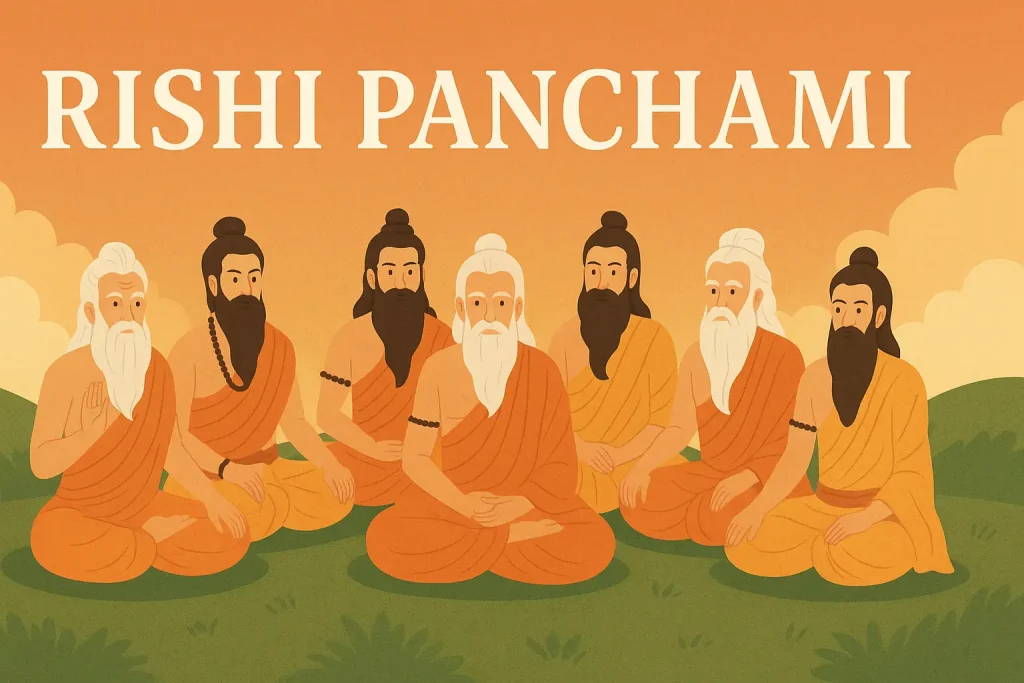
Greetings, and welcome back to Smarthguru Dhara Blog
Today, we will discuss the sacred Rishi Panchami Vrat Katha — not one, but two important stories that highlight the importance of respecting sages and elders.
The Rishi Panchami fast is observed on the fifth day (Panchami) of the bright fortnight in the month of Bhadrapada. On this day, we do not worship God directly, but instead offer prayers to the Saptarishis (Seven Great Sages).
This vrat is considered very auspicious for women. Observing it with devotion cleanses one of sins, especially those related to impurity during the menstrual cycle. It is believed that if the vrat is performed and its story heard with full faith, all sorrows in life are removed.
Story 1 – The Brahmin Couple’s Mistake
Long ago, a Brahmin lived with his wife in a certain city. One day, the wife invited several Brahmins for a meal. On the same day, she began her menstrual cycle. Worried, she asked her neighbor for advice. The neighbor told her to bathe seven times, change clothes seventy-five times, and then cook.
The woman followed this, but when the Brahmins came, they saw with their divine vision that worms were crawling in the food. They understood the impurity and became angry. They cursed the Brahmin and his wife to be born as animals in their next life.
Rebirth as a Dog and an Ox
In their next birth, the wife was born as a female dog, and the husband as an ox. They lived in their son’s house.
One day, the son’s wife invited Brahmins during Shraddha. She made many delicious dishes, including kheer (sweet rice pudding). While she stepped out, a snake came and vomited poison into the kheer.
The dog saw this and thought, “If the Brahmins eat this, they will die, and my son will bear the sin of killing them.” To save them, she touched the pot to spoil it.
Cruelty and Misunderstanding
When the daughter-in-law saw the dog do this, she became angry, struck it with a burning stick, threw away the food, and refused to feed either the dog or the ox.
That night, the hungry dog went to the ox and said, “I saved them, yet I was beaten and starved.” The ox replied, “I too worked all day and was not fed. We are suffering due to our past sins.”
Their son overheard this and, saddened, fed them immediately. Then he went to the forest to seek help from sages.
The Sages’ Guidance
The sages told him, “Observe the Rishi Panchami fast with your wife, perform the rituals, and dedicate the merit to your parents.”
On the fifth day of the bright fortnight of Bhadrapada, the son and his wife bathed in a sacred river, wore clean clothes, worshipped the Saptarishis with full devotion, and transferred all the merit to his parents.
As a result, both were freed from their animal forms and attained higher births.
Story 2 – Indra, Nahusha, and the Importance of Respect
A respected person should always remain respected. When you insult someone truly worthy of honor, that is when a person’s downfall begins. Out of ego, people sometimes disrespect those who are far greater than themselves. Elders, sages, saints, spiritual teachers, and God deserve respect.
Even Indra, king of the gods, once fell into ego. Drunk with pride, he insulted his guru, Brihaspati. The guru left in anger, and without his blessings, Indra became weak.
Like a hawk swooping on a weak bird, King Nahusha seized the throne of heaven. Power blinded him, and he lusted after Indra’s wife, Queen Shachi. Lust is blind — it cannot see right from wrong.
Shachi sought refuge with Guru Brihaspati’s wife. Out of compassion, she asked her husband to forgive Indra. But Nahusha was determined to have Shachi at any cost.
Brihaspati told him, “If you want Shachi, you must be carried to heaven on the shoulders of the great sages.” Nahusha agreed. The sages warned him of the consequences, but he ignored them.
When they walked slowly, he mocked and insulted them. Sage Durvasa, angered, cursed him:
“You have insulted the sages, the embodiment of knowledge. Become a python!”
Nahusha begged for release from the curse. The sages said, “When King Yudhishthir is born, his blessings will free you.” They also assured him that after the curse, he would receive the fruit of his devotion to Lord Hari.
Lessons from Both Stories
- Respect for elders, saints, and sages is a non-negotiable value.
- Ego and lust blind judgment and lead to downfall.
- Compassionate acts may be misunderstood, but righteousness prevails.
- The Rishi Panchami vrat can cleanse sins and bring spiritual liberation.
The Seven Great Sages (Saptarishis)
- Rishi Vishwamitra
- Rishi Jamadagni
- Rishi Atri
- Rishi Bharadwaj
- Rishi Kashyap
- Rishi Vashishta
- Rishi Gautam
How to Do Rishi Panchami Vrat
- Wake up early on the fifth day of the bright fortnight of Bhadrapada.
- Bathe in a sacred river or with water mixed with Ganga jal.
- Wear clean, fresh clothes (preferably white or yellow).
- Cleanse the home altar and prepare for the puja.
- Draw an image or place idols of the Saptarishis on a clean platform.
- Offer flowers, incense, dhoop, diya, and naivedya (food offering) to the sages.
- Recite the Rishi Panchami Katha (stories above) with devotion.
- Observe a fast — most devotees eat only curd and Sathi rice, or fruits and milk.
- Chant mantras such as “Om Rishibhyo Namah” while offering prayers.
- Conclude with an aarti and seek forgiveness for any mistakes.
- Donate to the poor or Brahmins as per your capacity.
Conclusion
On Rishi Panchami, we honor the sages, saints, and gurus. If one has unknowingly insulted or touched a sage in an impure state, this is the day for atonement.
By fasting, worshipping the Saptarishis, and listening to these sacred stories, one gains both worldly happiness and spiritual liberation.





